Teaching and Learning and Caring Blog
EL PASO – Have you ever reached in a jewelry, sewing, or tackle box and found a tangled mess? Sometimes I feel like life is more like a skein of yarn after the cat has played with it than an orderly sequence of years. We keep making the same mistakes and picking up things we need that are stuck together with things we don’t. Most of what we have is unusable or inefficient because it is in a jumble. Whether it is a heap of dirty clothing, collections of junk, or bad habits that have outlived their usefulness, we can’t find the time or peace of mind to straighten everything out.
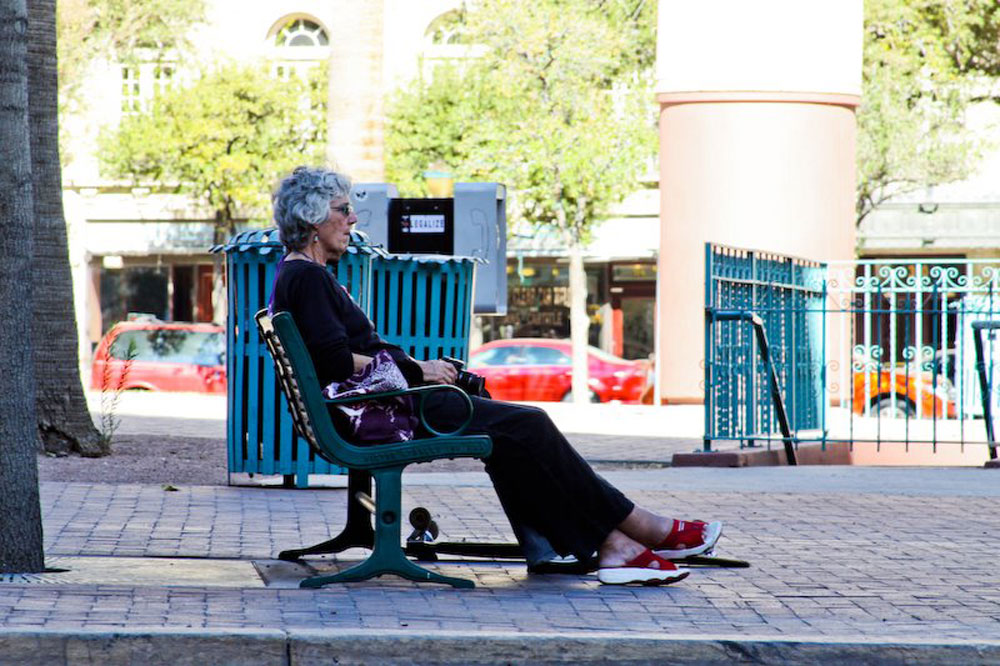
Me on park bench. (Raymundo Aguirre/Borderzine.com)
We roll through life and, like a magnet, pick up whatever we roll across. By the time my kids were grown and I retired, I had a new job cut out for me: untangling that jumbled life, sifting through the layers of time to discover both the debris and the underlying structure of my residence on earth. I began the task of paring down, throwing out what no longer worked, what was broken beyond repair, what I no longer needed. It is surprising what we don’t really need anymore. Things I never believed I could live without were gone with a coldness that surprised me. It wasn’t just things I tossed; I left behind people, patterns of behavior and thought, grudges, unnecessary words. I also left behind some things I enjoyed but were no longer relevant to my new life.
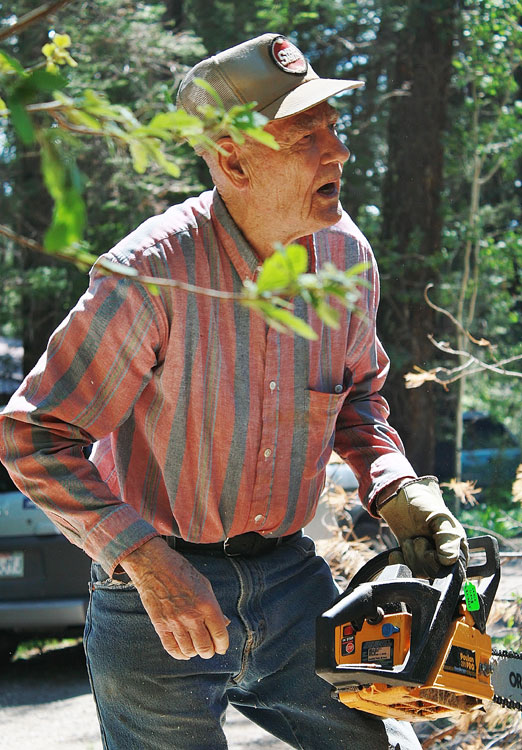
Louie Long of Cloudcroft, NM, clearing out dead trees with his chain saw. Louie lost his wife of many years, Jackie, on February 28th, 2012. (Cheryl Howard/Borderzine.com)
Maybe that steely coldness comes from inevitable loss that grows over time. When we are born, we need someone to provide everything. Then we need teachers, friends, lovers, jobs, a place to live, our own families, recognition, clothing, transportation, to be handsome or beautiful, etc. At first we need a lot of help, but gradually we figure out how to provide most things for ourselves. At some point, we outgrow teachers, our first job or first love, some of our childhood friends and inevitably, losses begin, some permanent. A classmate dies or a grandparent. Maybe a marriage ends or illness strikes. Losses accumulate. One day we realize we are the oldest generation in our families and most of the cards in our deck have already been played.
Being old brings with it painful reminders that the body is no longer young. But it also brings a certain freedom. Old people are practically invisible; no one really notices us, unless there are unnatural things attached to our bodies, like wheelchairs or oxygen tanks. We can listen in (if we can still hear from all the rock concerts we attended) and watch what is going on with historical perspective and a new clarity. It is a social scientist’s dream: to observe the world around without affecting it.
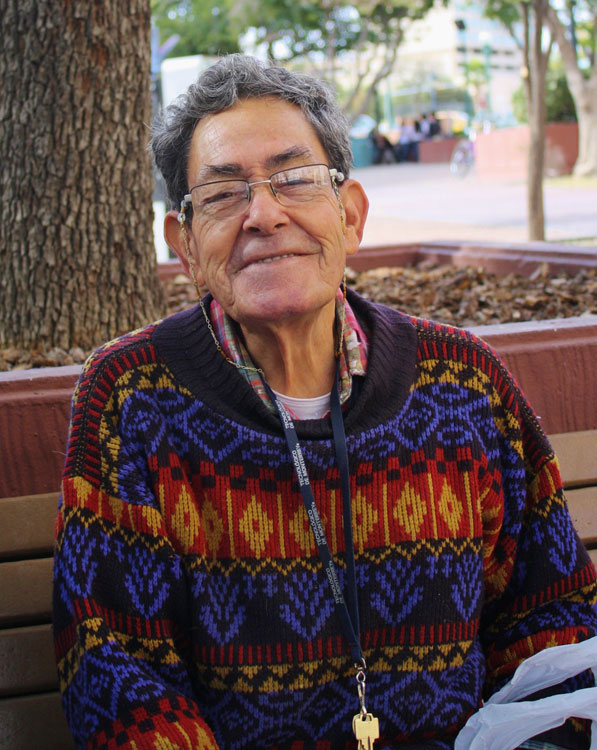
A beatific old man with a gorgeous smile that I found at Plaza Los Lagartos. (Cheryl Howard/Borderzine.com)
This time, for me, has been a fresh experience of lightness and freedom. Each day is an opportunity to decide exactly how I wish to spend it. That isn’t as easy as it sounds; it takes effort and imagination to construct a lovely day. We have been so trained to be a slave to the demands of the world, that we often don’t even recognize what pleases or annoys us by the time we get to the age where we can choose. It is difficult to make these decisions when we have so little experience. Maybe that is why some people fail to thrive in retirement, like suddenly being let out of prison.
Now, it doesn’t matter much to me anymore what people think. I wear and say and do what I please. Because I can … at least for now. I don’t have to tell anyone I have a Ph.D. I can wear pantuflas to the store. I can ask stupid questions or make comments that many would find embarrassing. It is almost impossible to embarrass a sixty-something.
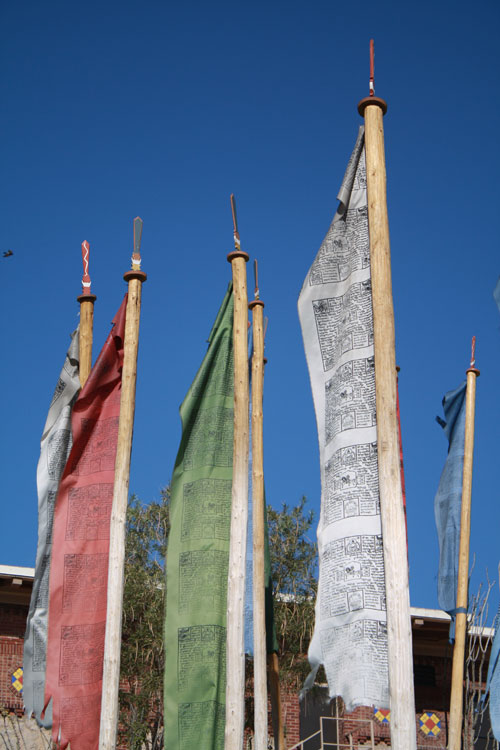
Bhutanese prayer flags on UTEP campus. (Cheryl Howard/Borderzine.com)
Even with the leisure that comes with retirement, time becomes more valuable because you finally know it is not inexhaustible. Relationships, likewise, are more precious. The hard truth is that one of you will eventually die. The things we attach so much value to in youth: money, power, prestige, and all their symbolic representations (e.g. cars, houses, clothes, diamonds) diminish in importance. We can live without wealth, without fame, even without caffeine, nicotine, alcohol, sex and other things we have not imagined. Buddhists believe that greed and cravings cause us to suffer, and that detaching from the causes of suffering is essential for enlightenment.
It might be a good thing for young people to imagine themselves old from time to time; they might consider their real priorities or spend time differently. I am pressing the wish that suffering will be diminished into the folds of the Bhutanese prayer flags on campus. The March winds should blow my prayer all around the border.
And meanwhile, if you see me or some other old person on a park bench or in the street, don’t think for a moment you are invisible to them just because they are invisible to you.
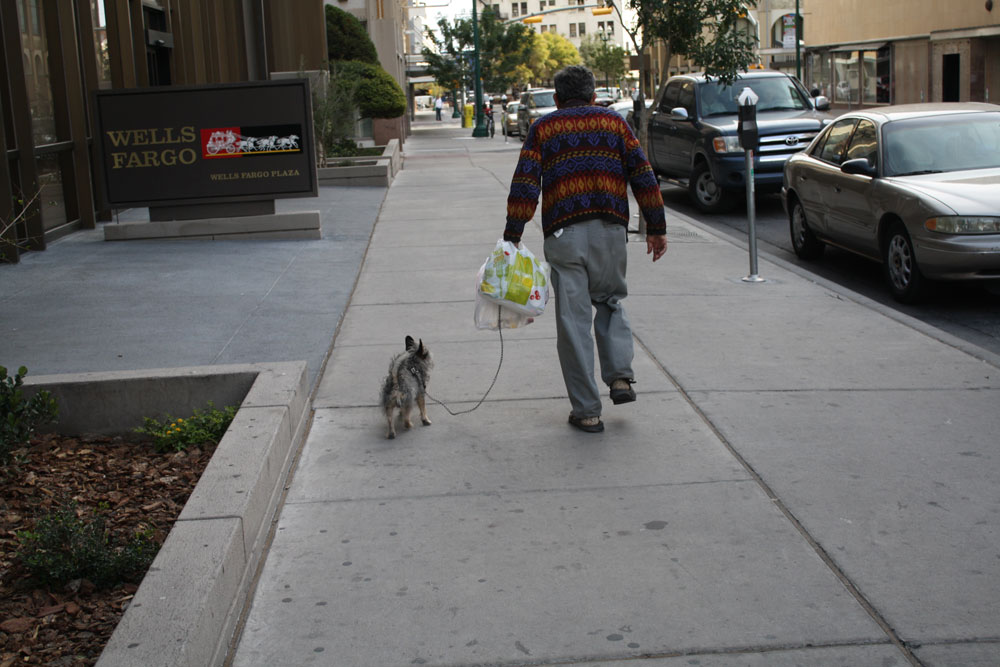
Time becomes more valuable because you finally know it is not inexhaustible... (Cheryl Howard/Borderzine.com)


